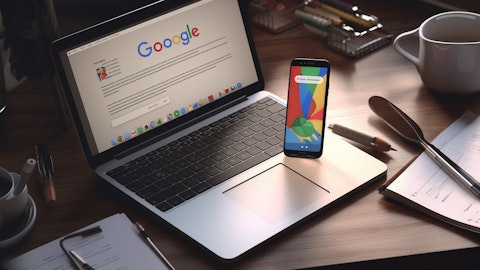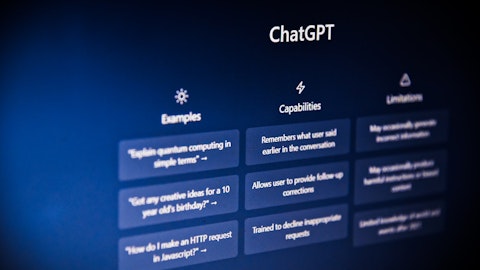Eric Sheridan: Thank you so much.
Operator: Your next question comes from Lloyd Walmsley with UBS. Your line is open.
Lloyd Walmsley: Great. Thanks for taking the question. Two, if I can, First, as we just think about the rollout of SGE across the user base, like how far along is that? And how do you balance the product rollout and consumer uptake versus monetization in that transition? And then the second one, also sort of Generative AI related. How quickly are you guys finding new ways of optimizing whether that’s shrinking model sizes, chip efficiencies or anything else? And do you think overall capital intensity of the business scales up or do you just find ways to do this more efficiently as usage scales? Anything you could share there would be great. Thanks.
Sundar Pichai: On the first part about SGE, we are still in a very — very early days in terms of how much we have rolled it out, but we have definitely gotten it out to enough people in both geographically across user segments and enough to know that the product is working well. It improves the experience and — but there are areas to improve, which we are fine tuning. Our true north here is getting at the right user experience we want to and pretty comfortable seeing the trajectory. And we’ve always worked through these transitions, be it from desktop to mobile, or from now mobile to an AI-enhanced experience. And so it’s nothing new, and I feel very comfortable that as we go through it, the strength of our teams, both on the organic side as well as ad side to drive the right experience for users, including ads will pay dividends.
So — and I think we’ll continue to make improvements and make progress there. On your second question, at a high level, I would say, all through the — we just celebrated 25 years and of all the things I was proud about when I looked at the strength of the work we have done across our infrastructure as a company, our technical infrastructure as a company and various given stages at a given moment in time, when we adopted new generations of technology, we have looked at the cost of it. But then the curves, the efficiency curves we have driven on top of it has always been phenomenal to see. And I see the current moment is no different. Already through this year, we are driving significant efficiencies, both in our models, in training costs and serving costs and our ability to adapt what’s needed to the right use case.
And so I think we’ll do everything that is needed to make sure we have the leading AI models and infrastructure in the world, bar none, and will continue driving efficiencies from there.
Lloyd Walmsley: Okay. Thank you.
Operator: Your next question comes from Michael Nathanson with MoffettNathanson. Your line is now open.
Michael Nathanson: Thank you. I’m going to ask you guys a multipart question on YouTube TV. So firstly, what were the broader objectives for getting Sunday Ticket? How does it perform versus those objectives? What lessons have you learned from having the NFL Sunday Ticket and how does that affect your appetite for more sports going forward? Thanks.
Philipp Schindler: So, as Sundar said earlier, we’re several weeks into our first season, and we’re very pleased with how it’s going, I think, in the broader context, you have to look at it as overall a YouTube subscription strategy. The great feedback we’ve gotten so far on the YouTube experience is very, very significant. People love the navigation. They love multi-view, they love the chats and the poles and frankly, people are very happy with the lack of latency here. The number one piece of concrete feedback the team has gotten is actually that people want the ability to pick their own games from multi-view which is — multi-view is the awesome feature, we started rolling out on YouTube TV that gives fans the ability to basically watch multiple streams here at once.
And yeah, overall, the teams are working hard to build a fantastic experience, and we are really trying to stay focused on getting our first season right and providing the best possible experience really for fans here.
Michael Nathanson: Thank you.
Operator: Your next question comes from Justin Post with Bank of America. Your line is now open.
Justin Post: Great. Thanks. A couple of questions on Q4. Can you provide any color on if there’s been any pause in advertising around the Middle East conflict in October, anything we should be aware of for Q4? And then second, when we do think about the Sunday Ticket impact, I know you can’t give us revenues or expenses, but overall, would that be a headwind to margins in Q4 or something we should be thinking about? Thank you.
Ruth Porat: So, look, on your — on the first question, obviously, this is a tragic, tragic — there are no words to talk about what’s going on. And all of our focus has been on supporting our people there and how our products can be as helpful as possible in this very painful time, broadly. And so nothing really to add. And then in terms of the second question, Sunday Ticket, the only thing I tried to call out there is that clearly, this is the first full quarter of Sunday Ticket that is contributing overall to the subscription revenues that we see. That’s in part of other revenues also, obviously, is contributing to higher CAC in the fourth quarter. So try to make that really clear. And as we look longer term, we expect to generate an attractive return over the life of the deal.
We’re continuing to invest in support of this and excited about the additional opportunities that come out of it, working with partners to deliver clips and other opportunities. As we’ve said, we’ve heard positive feedback from our partners at the NFL about the new features and live stream reliability. And this is really a clear example of our ability to execute big partnerships with excellence at scale and really leverage a lot of the extraordinary magic at YouTube and across Google, and that’s what we’re excited about.
Justin Post: Great. Thank you.
Operator: Your next question comes from Ken Gawrelski with Wells Fargo. Your line is now open.
Ken Gawrelski: Thank you so much. Two questions, if I may. First, how do you think about the future — the future structure of AI-driven search capabilities? Will activity remain centralized in a Search bar or will it be decentralized and present in many different applications, including on third-party applications? You alluded to Bard being integrated into multiple Google experiences early in the call. And then the second question is, any update on the Chrome cookie deprecation plan to begin in 1Q ’24. What have you seen so far based on your early testing of privacy sandbox and what advertiser feedback have you received?
Sundar Pichai: On your first question, look, I broadly think of it as people are looking for information. They always look for it in many, many different ways. We’ve given the product search example. People can directly go to Amazon as an example or come to Google. So if you zoom back and take an information view of the world, there’s always been many different ways to get it. And part of our work we do in making Search be world-class and give users what they’re looking for so that we can get it as much of that intent as possible. So I don’t see that changing. With mobile, there were more ways people could get information, but we worked out to make Search work better in the mobile world. And similarly, a view with AI, there’ll be many ways people get information, but it also offers us an opportunity in Search and in Assistant to take it to the next level and answer use cases, which we couldn’t have done before and expand the diverse set of needs where we are sourced.
So that’s how I see the opportunity ahead.
Philipp Schindler: And to the second part of your question, yes, Chrome still plans to begin phasing out third-party cookies in the second half of ’24. In the last several months, Chrome has really made significant progress on the privacy sandbox with APIs for developer testing, and they’re not generally available in Chrome. Our ads team is testing these APIs. And as we shared back in April, the preliminary results of our interspace ads testing showed that a combination of what we call privacy preserving signals and AI optimization actually provides positive results for businesses preparing for a cookie-less future. We also recently announced that in Q1 of ’24, we plan to deprecate third-party cookies for 1% of Chrome users, and this will support developers, obviously, in conducting their real-world experiments to assess the readiness and effectiveness of their products in this — without third-party cookies.





